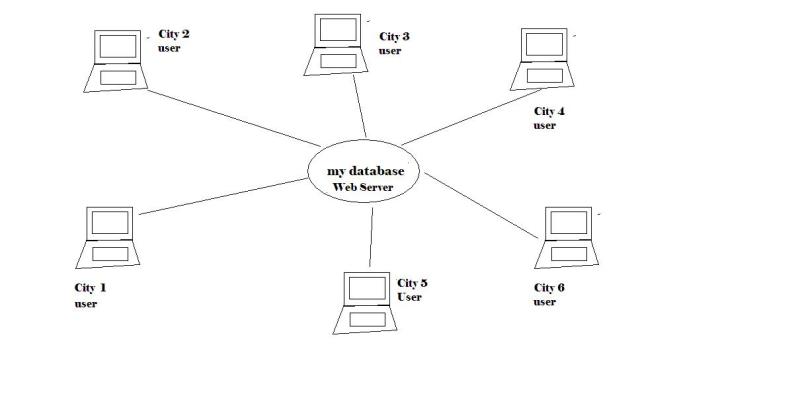No, you need a hosted database, your installation needs a driver to access it.
Do you really need a central database. It's unnecessary to explain all users will need your data, as you could also install it on each single client.
The question rather is: Do the users share data, or does any user only see the stem data you install plus his own data?
Then this still is no candidate for creating a central database.
Do you often need to update your software or stem data?
This on the other hand would again be a good reason to host a web application.
If you want users be able to use your software after subscribing/creating an account (and paying a fee) that would rather mean your customers need nothing but a browser and you create a web application plus database you host at some company, eg GoDaddy or Rackspace in the US or something appropriate for your country.
Then we're back to square one, but you can't run your foxpro app with foxpro data centralized. The only solution for that would be allowing access to remote desktop clients, but that's quite expensive per terminal server client access license. It's also only a typical solution for company employees or service contractors to which you have a higher level of trust, and it requires lots more of resources of RAM and disk space, users will be running a virtual PC at the central terminal server in that case, which also adds to the cost of the access licenses and makes it less good scalable.
So let me summarize the scenarios
1. Independent traditional client desktop installations. Perhaps with regular updates of EXE and data.
Data can be stored encrypted for sake of not allowing access to your initial/stem data.
Pros: VFP EXE + encrypted DBFs. Easy with Crytpor. Good scalability, every user has his own computer.
Cons: need Cryptor or similar, setup/update process for users.
2. A Terminal Server and clients accessing it via Remote Desktop or similar software (eg Citrix).
Your software and your data as is runs remotely controlled.
Pros: VFP EXE + DBFs as is
Cons: High costs for hardware and licenses, less good user experience (remote usage can ideally feel live, but will have a lag time)
3. Web Application / Web Database
Pros: No installation for users, central place for data and application.
Cons: You trust a hoster at miniumum about your data and its security against hackers, etc.
Not possible in pure VFP, even if you can get a activevfp (or similar) hoster, your frontend will be HTML/CSS and Javascript likely also is involved.
Total rewrite of most parts, even with activeVFP the approach to react to requests is totally different from a normal desktop application.
4. Desktop application with centralized database (only database hosting)
Pros: Still an EXE in VFP
Cons: You still will trust a hoster hosting your data, your EXE data access needs to be rewritten for client/server remote data access, most likely that means a total rewrite in VFP with eg sqlpassthrough
In regard of 4 there is no such thing as DBF database hosting, file server protocols are not internet protocols, even if they share using TCP/IP and thus you can't host your data as is. As Dan said your requirements really don't allow any of these scenarios. Data can be read, if only record by record displayed, your application has to make use of it somehow. Especially with a web application such scraping off data with web crawlers is done, no matter if legal or not.
Bye, Olaf.


![[cheers] [cheers] [cheers]](/data/assets/smilies/cheers.gif)